Excavation Contractors Berkeley
Find the best Excavation Contractors in Berkeley
Receive 3 FREE Excavation Company Near Me quotes for your project today! Compare profiles, reviews, accreditations, portfolio, etc... and choose the best offer.

Always Underground Inc
3.316 reviews20603 Burl Court, 20603 Burl Ct, Joliet, 60433, USBuilding Trust with Quality Work Respected for our integrity, Gold Shovel Standard certified for safety About Us AUI is a full service Woman Owned Business, design build utility construction company specializing in wireless /wireline, aerial and underground projects. With over 60 years of experience AUI has been providing 24/7 emergency response to the most challenging of projects. Our design, build, turn-up and test teams are well positioned throughout Illinois, Indiana, Wisconsin, Michigan, Iowa, Ohio, Kentucky and eastern Missouri to be able to assist now. Our emergency response crews have mobilized to support storm damage and other natural disasters for decades. Please see our Services tab and check out our capabilities Working Together We offer an end-to-end client experience that includes seamless communication, budgeting, staffing, on-site organization, and solid, quality construction every time. Our relationships with over 80 jurisdictions in the Midwest provide our clients peace of mind their projects will be completed on time and on budget. Why Choose Us? We work with all stake holders to bring quality, infrastructure Projects to life. Call us today and bring our project management skills and extensive construction experience to your next project.
- Services
- Why Us?
- Gallery
Get Quote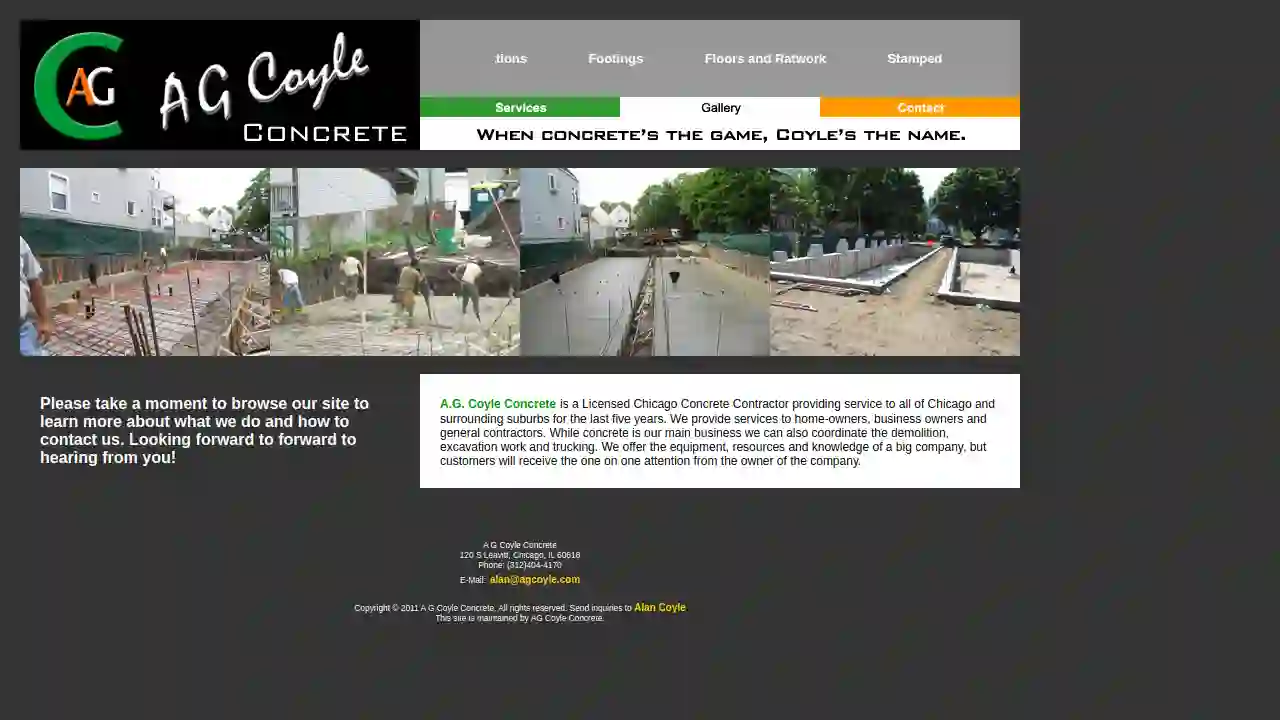
AG Coyle Concrete
120 S Leavitt, Chicago, 60618, USA.G. Coyle Concrete: Your Trusted Chicago Concrete Contractor A.G. Coyle Concrete is a licensed and experienced Chicago concrete contractor serving the city and its surrounding suburbs for the past five years. We are dedicated to providing top-notch concrete services to homeowners, business owners, and general contractors alike. While concrete is our core expertise, we also offer a comprehensive range of services, including demolition, excavation, and trucking. We bring the resources and knowledge of a larger company, but with the personalized attention you'd expect from a family-owned business.
- Services
- Why Us?
- Gallery
Get Quote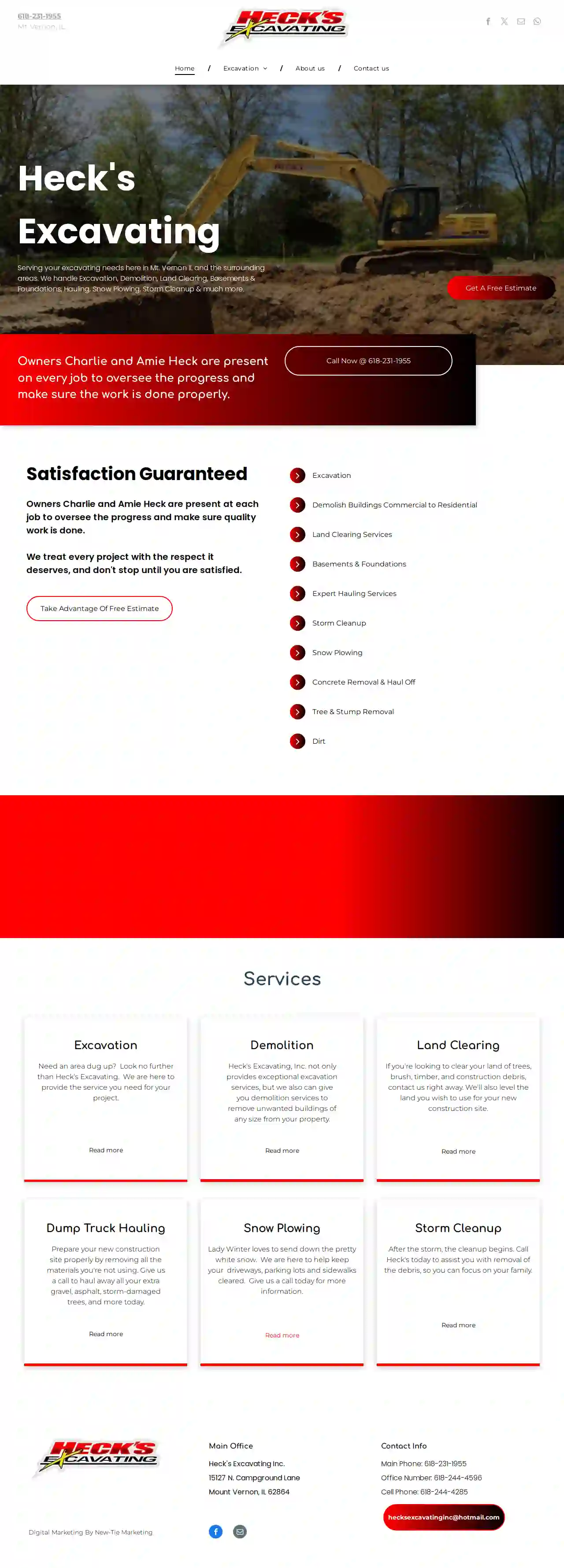
Heck’s Excavating
15127 N. Campground Lane, Mount Vernon, 62864, USHeck's Excavating: Your Trusted Partner for Excavation and More Heck's Excavating Inc. has been serving the Mt. Vernon, IL area and surrounding communities since 2009. We are a family-owned business dedicated to providing high-quality excavation, demolition, and other services with a commitment to customer satisfaction. Our Commitment to Quality Owners Charlie and Amie Heck are personally involved in every project, ensuring that every job is completed to the highest standards. We believe in treating every project with the respect it deserves, and we don't stop until you are completely satisfied. A Wide Range of Services From excavation and demolition to land clearing, basement and foundation work, hauling, snow plowing, and storm cleanup, Heck's Excavating is your one-stop shop for all your project needs. We are equipped to handle projects of all sizes, both residential and commercial. Experience the Heck's Difference We take pride in our work and treat every job as if it were our own home or office. Our commitment to quality, service, and customer satisfaction sets us apart. Choose Heck's Excavating for a reliable and trustworthy partner for your next project.
- Services
- Why Us?
- Our Team
- Gallery
Get Quote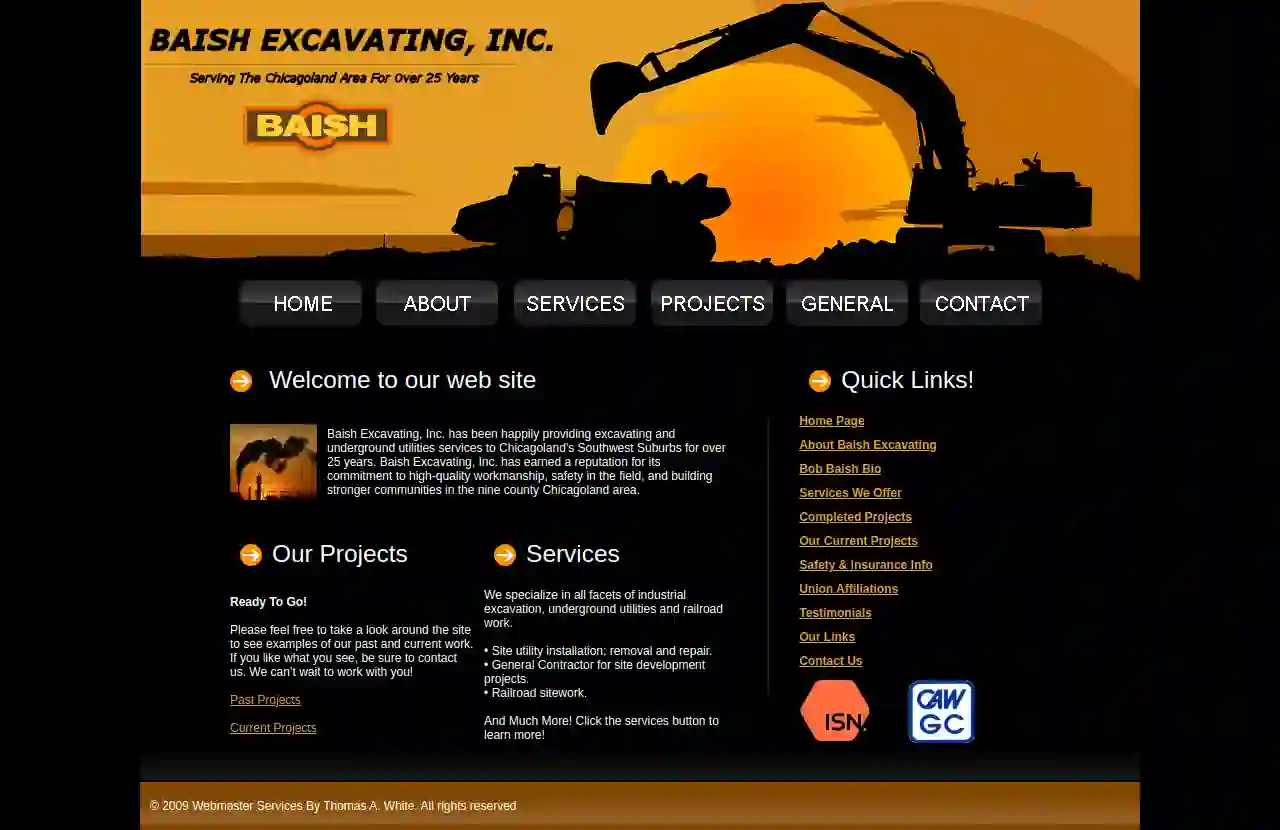
Baish Excavating, Inc.
3485-B Rt 126, Oswego, 60543, USBaish Excavating: Building Stronger Communities For over 30 years, Baish Excavating, Inc. has been a trusted name in Will County, Grundy County, and surrounding communities. A member of the Contractor's Association of Will and Grundy Counties since 1991, Baish Excavating, Inc. contributes to projects that build businesses, renovate the land and benefit the local economy. In 1985, Bob Baish founded Baish Excavating because he saw the need for high-quality excavating and underground utilities services in his community � an area that had the potential for immense residential and industrial growth. With that vision in mind, he rented a shop on Plainfield-Naperville Road in Plainfield, Illinois with a modest crew of three men (one of which was Bob�s dad, Art) and four machines. Today, the shop has upgraded in size and houses 35 pieces of machinery. The crew and staff has expanded along with the size of the workload, but the same old work ethic applies: Baish Excavating, Inc. is committed to building stronger local communities, one job at a time.
- Services
- Why Us?
- Our Team
- Testimonials
- Gallery
Get Quote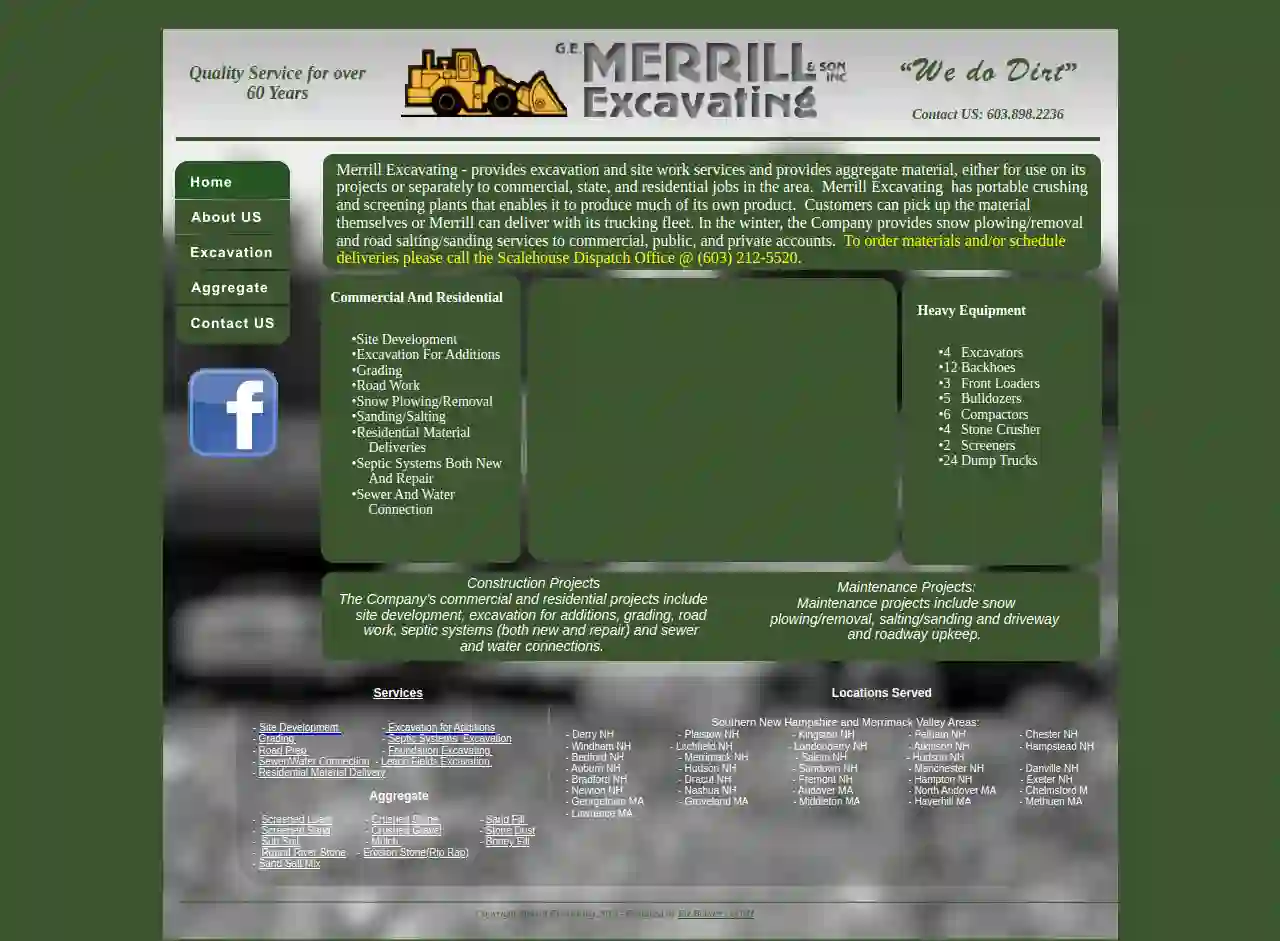
Merrill Excavating
425 reviews38 School Street, Salem, 03079, USMerrill Excavating - Quality Since 1953! Over the past 60 years Merrill Excavating has evolved with the needs of our community and its people. Our commitment keeps our business both a leader and trusted name in our local community. History George E. Merrill founded the company in 1953 with humble beginnings - one tractor and one employee. Under his direction and determined efforts, the company would grow to become an essential member of the local construction community. In 1980, his son George D. took over the company and started to expand its products and services to meet the changing needs of its growing community and customer base. Since George D. Merrill's retirement, his sons Gary and Jonathan have run the company, which now has over 45 employees and a large inventory of equipment suited to any job, large or small. The company also has a sand and gravel pit located in Salem, NH. To order materials and/or schedule deliveries please call the Scalehouse Dispatch Office @ (603) 212-5520.
- Services
- Why Us?
- Gallery
Get Quote
Accelerated Excavation
511 reviews1202 S Court St, Marion, IL, 62959, USWho we are Accelerated Excavation is a premier excavation service provider specializing in municipality, commercial, and residential projects. With a team of highly skilled professionals and state-of-the-art equipment, we deliver top-quality excavation solutions tailored to meet the unique needs of each project. Who we work with Real estate developers General contractors Homeowners & Business Owners Engineers Utility Companies Municipalities Government Agencies Our mission Provide reliable, efficient, and safe excavation services, ensuring every project is completed on time and to the highest standards. We are committed to excellence, customer satisfaction, and environmentally responsible practices, making us the trusted partner for all your excavation needs. Why Customers Choose Accelerated Excavation Safety First: Strict adherence to safety protocols on every job site Trained Team: Skilled & trained contractors with years of industry experience On Time, Everytime: Projects completed on schedule, every time Advanced Equipment: State-of-the-art machinery for precise and efficient excavation
- Services
- Why Us?
- Testimonials
- Gallery
Get Quote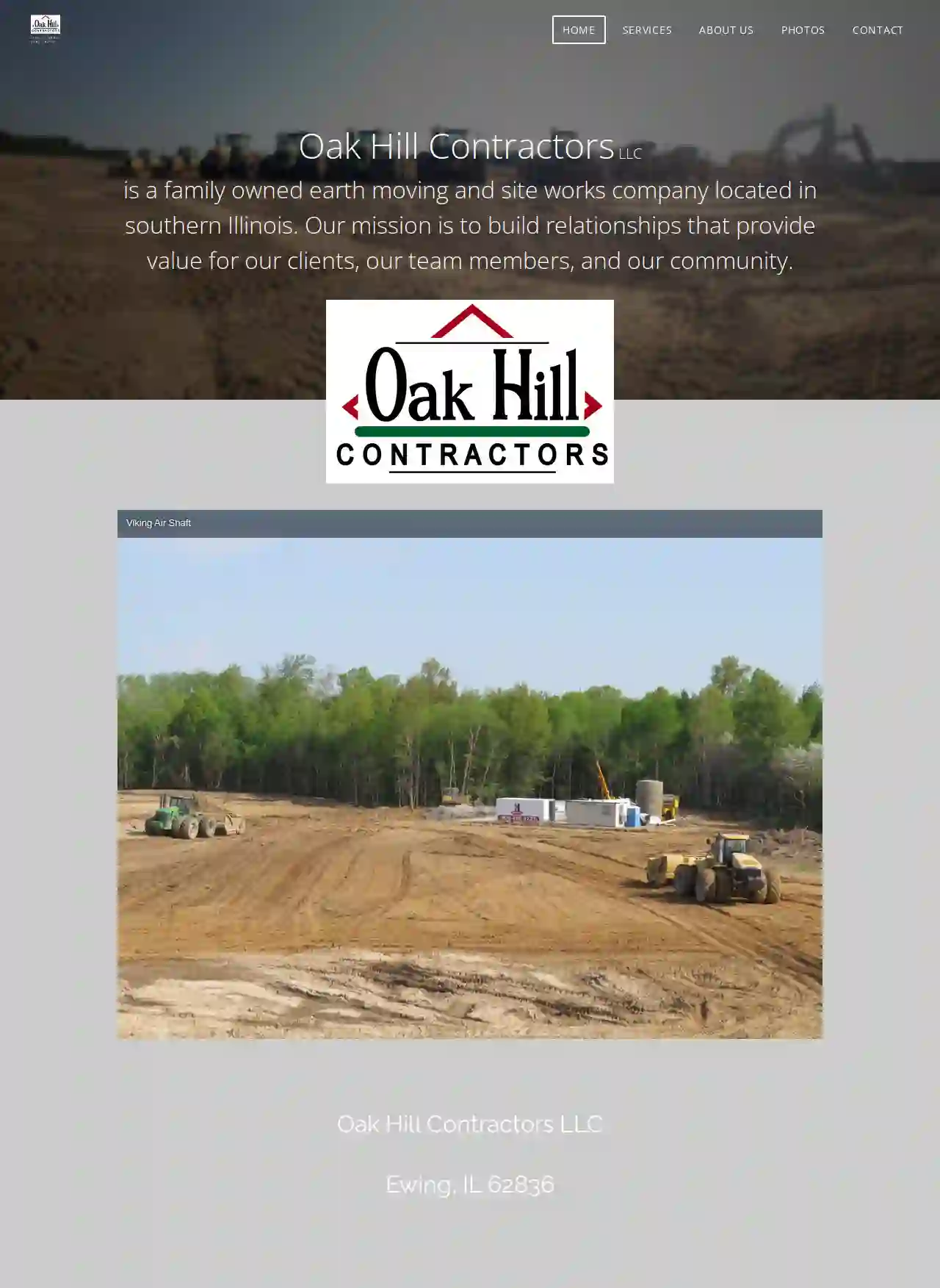
Oak Hill Contractors LLC
53 reviews20245 Ewing Road, Ewing, 62836, USAbout Oak Hill Contractors LLC Oak Hill Contractors LLC is a family-owned earth moving and site works company based in southern Illinois. We are dedicated to building strong relationships with our clients, team members, and the community, ensuring value for everyone involved. Our commitment to quality work and a wide range of equipment allows us to handle projects of all sizes. We utilize GPS-equipped machines for efficient and accurate grading work, ensuring precision and timely completion. We are proud to be Prequalified by IDOT and have MSHA-trained personnel. We are also fully insured, providing peace of mind to our clients. Take a look at one of our recent projects: Sugar Camp Refuse Expansion.
- Services
- Why Us?
- Gallery
Get Quote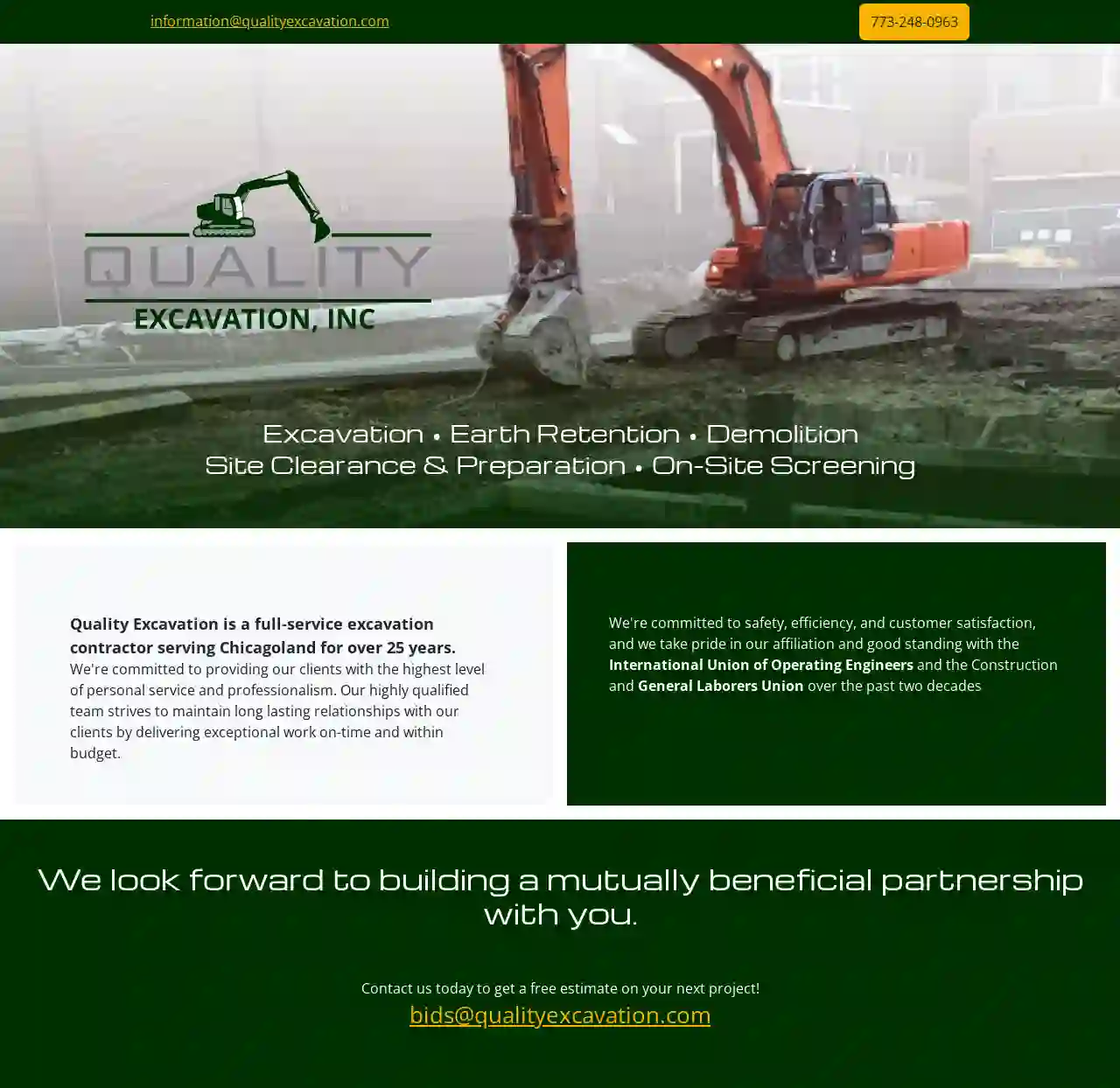
Quality Excavation Inc
54 reviewsChicago, USQuality Excavation: Your Trusted Chicagoland Excavation Partner Quality Excavation is a full-service excavation contractor serving Chicagoland for over 25 years. We're dedicated to providing our clients with the highest level of personalized service and professionalism. Our highly skilled team is committed to building lasting relationships by delivering exceptional work on time and within budget. We prioritize safety, efficiency, and customer satisfaction. We're proud of our strong affiliations and good standing with the International Union of Operating Engineers and the Construction and General Laborers Union over the past two decades. We look forward to building a mutually beneficial partnership with you. Contact us today for a free estimate on your next project!
- Services
- Why Us?
Get Quote
F.L. Merrill Construction, Inc.
51 reviews35 Veterans Drive, Loudon, 03275, USProudly Serving New Hampshire Since 1990. Located In Loudon, NH Family Owned & Operated NH Construction Company Get A Quote Municipal Construction We specialize in road construction for small local subdivisions. Our expertise includes building, constructing, & repairing roadways. Commercial Construction Our New Hampshire commercial construction experience includes land clearing, site work, utility installation, and more. Residential Construction Whether you need help with excavation for a new septic system or any other excavation need, our team has 25+ years of experience. Who We Are A Dedicated Team Of Construction Experts F.L. Merrill Construction's success is built on a foundation of hard work and dedication, values that are shared by everyone from upper management to construction crew members. Frank and Sue Merrill realized their ability to provide customers with a superior service comes down to their team who are consider to be an extension of their family. By investing in its people, Merrill Construction has established itself as a NH construction industry leader for over three decades. Tell us about your project! Land Clearing Site Work Utility Installation Road Construction Bridge Construction Footing Foundations Residential Excavation Materials Supply Trucking & Dumping Get A Free Quote Today! Get A Quote
- Services
- Why Us?
- Testimonials
- Gallery
Get Quote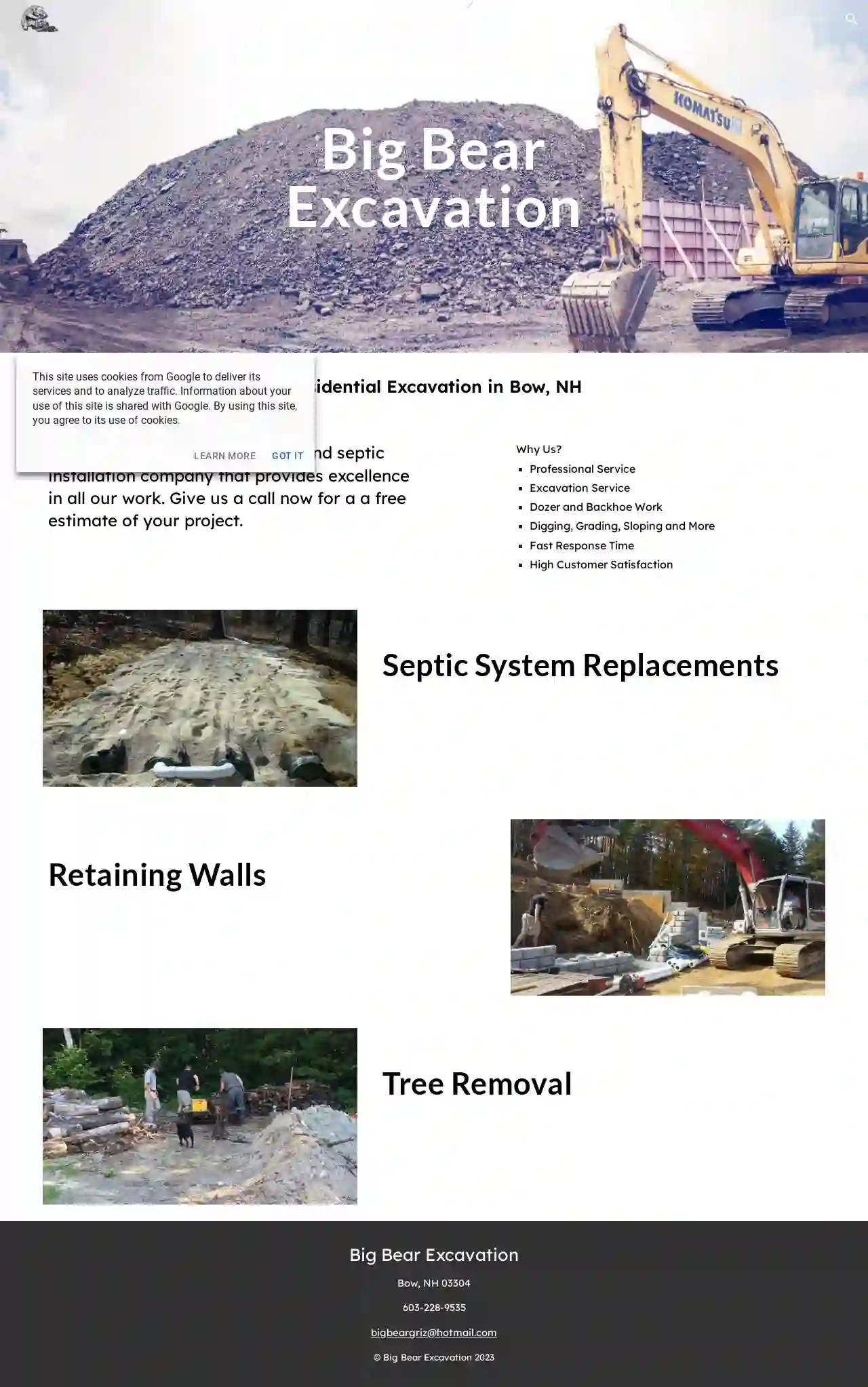
Big Bear Excavation
51 reviewsBow, 03304, USBig Bear Excavation We are a residential excavation and septic installation company that provides excellence in all our work. Give us a call now for a free estimate of your project. Why Us? Professional Service Excavation Service Dozer and Backhoe Work Digging, Grading, Sloping and More Fast Response Time High Customer Satisfaction Septic System Replacements Retaining Walls Tree Removal
- Services
- Why Us?
- Gallery
Get Quote
Over 22,076+ Excavation Pros on our directory
Our excavation companies operate in Berkeley and surrounding areas!
ExcavationHQ has curated and vetted Top Excavation Businesses in Berkeley. Find a top & reliable contractor today.
Frequently Asked Questions About Excavation Contractors
- Clear the Area: Remove any obstacles, including vehicles, outdoor furniture, landscaping features, or structures, from the excavation zone and surrounding area.
- Mark Existing Features: Identify and mark underground utilities, septic tanks, sprinkler systems, or other buried elements you want to protect.
- Protect Landscaping: Use tarps or fencing to shield trees, shrubs, gardens, or other landscaping elements from damage.
- Provide Access: Ensure the excavation contractor has clear access to the work area, including gates wide enough for equipment.
- Discuss Logistics: Coordinate with the contractor regarding parking arrangements, material delivery, and any special instructions or concerns you might have.
- Planning and Surveying: Defining the excavation area, marking utility lines, and determining the required depth and grade.
- Site Preparation: Clearing vegetation, removing obstacles, and ensuring site accessibility.
- Excavation: Using appropriate equipment (excavators, backhoes, etc.) to remove earth and create the desired excavation.
- Hauling and Disposal: Transporting excavated material to designated disposal sites, complying with environmental regulations.
- Backfilling and Compaction: Refilling the excavation with suitable material and compacting it to achieve the required density and stability.
- Grading and Finishing: Leveling and shaping the surface to the final grade for landscaping or construction.
- Topsoil Removal: Stripping the fertile topsoil layer from a site, often preserving it for landscaping.
- Trench Excavation: Digging long, narrow trenches for utilities (pipes, cables) or foundations.
- Basement Excavation: Removing earth to create a space for a basement beneath a structure.
- Pool Excavation: Digging a precise hole for installing a swimming pool.
- Roadway Excavation: Removing earth and preparing the ground for road construction.
- Demolition Excavation: Clearing debris and preparing the site after demolition.
- Channel Excavation: Creating channels for drainage or irrigation.
How do I prepare my property for excavation?
What is the difference between topsoil and subsoil?
Topsoil: The uppermost layer, typically rich in organic matter, nutrients, and microorganisms. It's essential for plant growth and is often darker in color.
Subsoil: The layer beneath the topsoil, containing less organic matter and generally denser. It provides support for roots but is less fertile than topsoil.
During excavation, topsoil is often removed and preserved separately for later use in landscaping, while subsoil is typically used for backfilling or other less demanding applications.
What is the excavation process?
What are the different types of excavation?
How do I prepare my property for excavation?
- Clear the Area: Remove any obstacles, including vehicles, outdoor furniture, landscaping features, or structures, from the excavation zone and surrounding area.
- Mark Existing Features: Identify and mark underground utilities, septic tanks, sprinkler systems, or other buried elements you want to protect.
- Protect Landscaping: Use tarps or fencing to shield trees, shrubs, gardens, or other landscaping elements from damage.
- Provide Access: Ensure the excavation contractor has clear access to the work area, including gates wide enough for equipment.
- Discuss Logistics: Coordinate with the contractor regarding parking arrangements, material delivery, and any special instructions or concerns you might have.
What is the difference between topsoil and subsoil?
Topsoil: The uppermost layer, typically rich in organic matter, nutrients, and microorganisms. It's essential for plant growth and is often darker in color.
Subsoil: The layer beneath the topsoil, containing less organic matter and generally denser. It provides support for roots but is less fertile than topsoil.
During excavation, topsoil is often removed and preserved separately for later use in landscaping, while subsoil is typically used for backfilling or other less demanding applications.
What is the excavation process?
- Planning and Surveying: Defining the excavation area, marking utility lines, and determining the required depth and grade.
- Site Preparation: Clearing vegetation, removing obstacles, and ensuring site accessibility.
- Excavation: Using appropriate equipment (excavators, backhoes, etc.) to remove earth and create the desired excavation.
- Hauling and Disposal: Transporting excavated material to designated disposal sites, complying with environmental regulations.
- Backfilling and Compaction: Refilling the excavation with suitable material and compacting it to achieve the required density and stability.
- Grading and Finishing: Leveling and shaping the surface to the final grade for landscaping or construction.
What are the different types of excavation?
- Topsoil Removal: Stripping the fertile topsoil layer from a site, often preserving it for landscaping.
- Trench Excavation: Digging long, narrow trenches for utilities (pipes, cables) or foundations.
- Basement Excavation: Removing earth to create a space for a basement beneath a structure.
- Pool Excavation: Digging a precise hole for installing a swimming pool.
- Roadway Excavation: Removing earth and preparing the ground for road construction.
- Demolition Excavation: Clearing debris and preparing the site after demolition.
- Channel Excavation: Creating channels for drainage or irrigation.